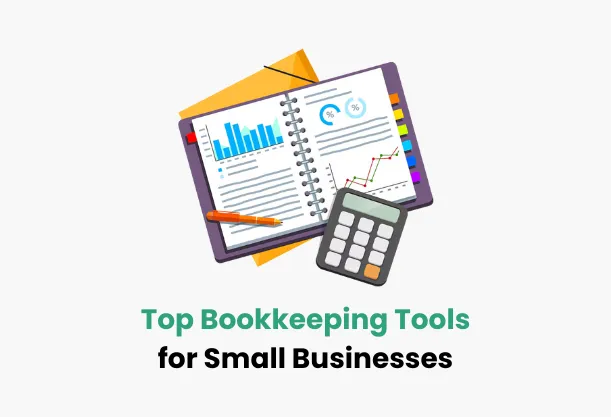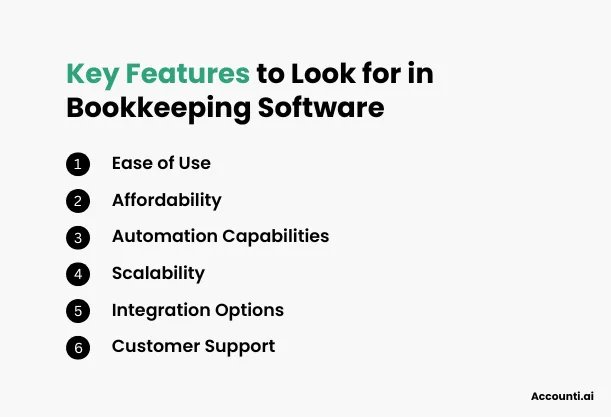
Best Bookkeeping Program for Small Business in 2025
Managing finances is one of the most crucial tasks for any small business owner, but it can also be one of the most time-consuming. From tracking expenses and managing invoices to ensuring tax readiness, accurate bookkeeping is essential. Thankfully, with the right bookkeeping software, small businesses can streamline these processes, save time, and minimize errors.
In this guide, we’ll explore the best bookkeeping programs available for small businesses, covering features, pricing, and specific benefits for different types of businesses.
Why Bookkeeping Software is Essential for Small Businesses
If you’re still manually keeping your books, you may wonder: Is it worth switching to bookkeeping software? For small businesses, the answer is often a resounding "yes." Here’s why:
- Saves Time: Bookkeeping software automates time-consuming tasks like data entry, invoice generation, and bank reconciliation, allowing you to focus on growing your business.
- Reduces Human Error: Manual bookkeeping is prone to mistakes, especially when handling large amounts of data. Software reduces this risk, ensuring your records are accurate.
- Simplifies Tax Prep: By keeping organized records, bookkeeping software makes tax preparation easier, so you don’t scramble during tax season.
- Helps Scale Your Business: As your business grows, software allows you to easily handle increasing financial transactions and track business performance.
Key Features to Look for in Bookkeeping Software
When selecting a bookkeeping program, consider the following features to ensure it fits your business needs:

Ease of Use
Choose software with an intuitive design and minimal learning curve, especially if you’re not familiar with accounting principles.
Affordability
Small businesses operate on tight budgets, so pricing is crucial. Look for affordable options or programs offering flexible pricing plans.
Automation Capabilities
Automation saves time by generating invoices, categorizing expenses, and even reconciling bank transactions. The more a program automates, the less work you have to do manually.
Scalability
As your business grows, so do your bookkeeping needs. Ensure the software can grow with you, either by upgrading plans or adding more features as needed.
Integration Options
Many programs integrate with other tools like CRM, payroll, and project management software, providing a seamless experience across your business operations.
Customer Support
Good customer support can be a lifesaver if you encounter issues or need guidance on using specific features.
Top Bookkeeping Programs for Small Businesses in 2025
Let’s dive into the top choices for bookkeeping software, each with unique benefits tailored to different types of small businesses.
1. QuickBooks Online
QuickBooks Online is one of the most popular bookkeeping solutions for small businesses. Known for its comprehensive features and scalability, it’s suitable for various business sizes and industries.
- Key Features: Invoicing, expense tracking, mileage tracking, inventory management, and tax readiness.
- Pros: Intuitive interface, customizable reports, and robust customer support.
- Cons: Can be costly for smaller budgets; a bit complex for complete beginners.
- Pricing: Plans start at $25 per month, with a 30-day free trial.
Ideal for small to medium-sized businesses looking for an all-in-one solution with advanced reporting features.
2. FreshBooks
FreshBooks is a favorite among freelancers and service-based businesses due to its simple invoicing and expense-tracking features.
- Key Features: Time tracking, customizable invoices, client management, and expense tracking.
- Pros: Easy to use, great for time-based billing, and strong mobile app support.
- Cons: Limited integrations and reporting features compared to QuickBooks.
- Pricing: Plans start at $15 per month, with a 30-day free trial.
Perfect for freelancers, consultants, and businesses focused on service-based work.
3. Xero
Xero is a strong option for businesses with international clients and employees, offering multi-currency support and strong integration capabilities.
- Key Features: Bank reconciliation, invoicing, payroll, and inventory management.
- Pros: Multi-currency support, extensive integration options, and a simple user interface.
- Cons: Limited customer support and lack of phone support.
- Pricing: Plans start at $13 per month, with a 30-day free trial.
Best for businesses with global transactions or those needing extensive integrations.
4. Zoho Books
Zoho Books is part of the Zoho suite, making it an excellent choice for businesses already using other Zoho products.
- Key Features: Invoicing, expense tracking, automated workflows, and inventory tracking.
- Pros: Strong integration with Zoho apps, affordable pricing, and powerful automation.
- Cons: Limited third-party integrations outside of the Zoho ecosystem.
- Pricing: Plans start at $15 per month, with a 14-day free trial.
Ideal for small businesses and startups looking for a budget-friendly solution with Zoho compatibility.
5. Wave Accounting
Wave Accounting offers a completely free option, making it perfect for small businesses with minimal budgets.
- Key Features: Invoicing, expense tracking, and receipt scanning.
- Pros: Free to use, user-friendly, and includes basic bookkeeping features.
- Cons: Limited features and no phone support; primarily for smaller-scale businesses.
- Pricing: Free for core features; payment processing and payroll are paid add-ons.
Best for businesses with simple bookkeeping needs that are on a tight budget.
Accounti
Accounti.ai simplifies financial management with tools for invoicing, payroll, and financial reporting, leveraging automation to reduce manual work. Accounti’s customizable features are ideal for businesses looking to streamline bookkeeping tasks, maintain tax readiness, and focus on growth.
Comparison Top Bookkeeping Programs
|
Bookkeeping Software |
Key Features |
Best For |
Starting Price |
Free Trial |
|
QuickBooks Online |
Invoicing, expense tracking, tax readiness |
Small to medium-sized businesses |
$25/month |
30 days |
|
FreshBooks |
Time tracking, invoicing, client management |
Freelancers and service-based businesses |
$15/month |
30 days |
|
Xero |
Multi-currency, payroll, integrations |
Businesses with international transactions |
$13/month |
30 days |
|
Zoho Books |
Automated workflows, invoicing, inventory |
Startups and Zoho users |
$15/month |
14 days |
|
Wave Accounting |
Invoicing, expense tracking |
Budget-conscious small businesses |
Free |
N/A |
How to Choose the Right Bookkeeping Program for Your Business
Choosing the right software depends on your unique business needs. Here’s what to consider:
- Assess Your Budget: Start by understanding what you’re willing to invest in a bookkeeping program. If funds are limited, a free option like Wave might work best.
- Identify Your Business Needs: Service-based businesses may prefer FreshBooks, while those needing multi-currency support might benefit from Xero.
- Use Free Trials: Almost all programs offer a free trial, so take advantage of these to see if the software meets your requirements.
- Consider Future Needs: Choose a program that can grow with you. QuickBooks, for example, is highly scalable, making it a good long-term investment.
Pros and Cons of Using Bookkeeping Software
Pros
- Increased Accuracy: Automation and error-checking features help keep records accurate.
- Time-Saving: Automates repetitive tasks, leaving you more time to focus on your business.
- Real-Time Data Access: Get an up-to-date view of your business's financial health anytime.
Cons
- Learning Curve: Some programs can be difficult to learn, particularly for beginners.
- Subscription Costs: Monthly or annual fees can add up.
- Data Security: Storing financial data digitally comes with potential security risks.
Conclusion
Selecting the right bookkeeping software can transform how you manage your business finances, making it easier, faster, and more accurate. Whether you’re a freelancer, small business owner, or run a larger operation, there’s a bookkeeping program to suit your needs. Take advantage of free trials, compare features, and consider your business’s future requirements to make the best choice.
FAQs
What software do most bookkeepers use?
Most bookkeepers rely heavily on QuickBooks Online for its comprehensive and versatile features that cover invoicing, payroll, expense tracking, and tax management. Other popular choices include Xero, known for its simplicity and integrations, and FreshBooks, which excels in invoicing and client management. For those needing a cost-effective solution, Wave Accounting provides a free platform that supports basic bookkeeping for small businesses and freelancers.
What is the best small business accounting software?
The best accounting software for small businesses often depends on specific needs, but QuickBooks Online is widely recommended for its balance of features and usability. For simplicity and lower costs, Xero and Zoho Books provide robust tools at accessible price points, while Wave Accounting is a solid free option. FreshBooks is a favorite among service-based businesses due to its easy invoicing and project management features.
Can a small business do their own bookkeeping?
Yes, small businesses can handle their own bookkeeping, especially with user-friendly software like QuickBooks, Xero, or Wave. These programs simplify tracking income, expenses, and generating reports. However, as a business grows or transactions become more complex, consulting a professional bookkeeper or accountant can add value by ensuring accuracy and compliance.
Can I do bookkeeping without QuickBooks?
Absolutely! While QuickBooks is popular, there are many alternatives that offer excellent features. Xero and Zoho Books are user-friendly and include extensive reporting and integration options. Wave Accounting is a free choice, ideal for businesses needing basic tools, and FreshBooks suits service-based businesses with strong invoicing features.
Who is QuickBooks' biggest competitor?
QuickBooks' biggest competitor is often considered to be Xero, which offers a user-friendly interface, multi-currency support, and an extensive array of integrations. FreshBooks is also a strong contender, especially for businesses focused on time tracking and invoicing, while Zoho Books competes by offering comprehensive features at a lower price point.
What is similar to QuickBooks but free?
If you're seeking a free alternative to QuickBooks, Wave Accounting is one of the best options. It includes features for invoicing, expense tracking, and basic financial reports without a cost. Zoho Books also offers a free version for businesses making less than $50,000 annually, providing small businesses with essential tools for managing finances effectively.

 Rohit Kapoor
Rohit Kapoor

